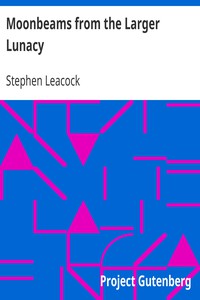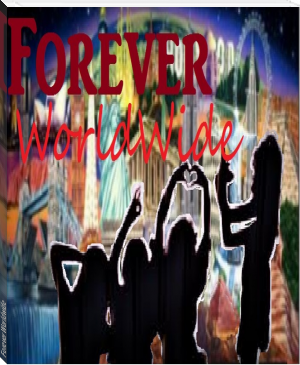Moonbeams from the Larger Lunacy, Stephen Leacock [best mobile ebook reader TXT] 📗

- Author: Stephen Leacock
Book online «Moonbeams from the Larger Lunacy, Stephen Leacock [best mobile ebook reader TXT] 📗». Author Stephen Leacock
Whenever I see him looking across at Blinks with his eyes half closed and with a baffling, quizzical expression in them, I know that he is looking at him through his periscope. Now is the time for Blinks to watch out. If he relaxes his vigilance for a moment he’ll be torpedoed as he sits, and sent flying, whiskey and soda and all, through the roof of the club, while Jinks dives into the basement.
Indeed it has come about of late, I don’t know just how, that Jinks has more or less got command of the sea. A sort of tacit understanding has been reached that Blinks, whichever army he happens at the moment to command, is invincible on land. But Jinks, whether as a submarine or a battleship, controls the sea. No doubt this grew up in the natural evolution of their conversation. It makes things easier for both. Jinks even asks Blinks how many men there are in an army division, and what a sotnia of Cossacks is and what the Army Service Corps means. And Jinks in return has become a recognized expert in torpedoes and has taken to wearing a blue serge suit and referring to Lord Beresford as Charley.
But what I noticed chiefly about the war mania of Jinks and Blinks was their splendid indifference to slaughter. They had gone into the war with a grim resolution to fight it out to a finish. If Blinks thought to terrify Jinks by threatening to burn London, he little knew his man. “All right,” said Jinks, taking a fresh light for his cigar, “burn it! By doing so, you destroy, let us say, two million of my women and children? Very good. Am I injured by that? No. You merely stimulate me to recruiting.”
There was something awful in the grimness of the struggle as carried on by Blinks and Jinks.
The rights of neutrals and non-combatants, Red Cross nurses, and regimental clergymen they laughed to scorn. As for moving-picture men and newspaper correspondents, Jinks and Blinks hanged them on every tree in Belgium and Poland.
With combatants in this frame of mind the war I suppose might have lasted forever.
But it came to an end accidentally,—fortuitously, as all great wars are apt to. And by accident also, I happened to see the end of it.
It was late one evening. Jinks and Blinks were coming down the steps of the club, and as they came they were speaking with some vehemence on their favourite topic.
“I tell you,” Jinks was saying, “war is a great thing. We needed it, Blinks. We were all getting too soft, too scared of suffering and pain. We wilt at a bayonet charge, we shudder at the thought of wounds. Bah!” he continued, “what does it matter if a few hundred thousands of human beings are cut to pieces. We need to get back again to the old Viking standard, the old pagan ideas of suffering—”
And as he spoke he got it.
The steps of the club were slippery with the evening’s rain,—not so slippery as the frozen lakes of East Prussia or the hills where Jinks and Blinks had been campaigning all winter, but slippery enough for a stout man whose nation has neglected his training. As Jinks waved his stick in the air to illustrate the glory of a bayonet charge, he slipped and fell sideways on the stone steps. His shin bone smacked against the edge of the stone in a way that was pretty well up to the old Viking standard of such things. Blinks with the shock of the collision fell also,—backwards on the top step, his head striking first. He lay, to all appearance, as dead as the most insignificant casualty in Servia.
I watched the waiters carrying them into the club, with that new field ambulance attitude towards pain which is getting so popular. They had evidently acquired precisely the old pagan attitude that Blinks and Jinks desired.
And the evening after that I saw Blinks and Jinks, both more or less bandaged, sitting in a corner of the club beneath a rubber tree, making peace.
Jinks was moving out of Montenegro and Blinks was foregoing all claims to Polish Prussia; Jinks was offering Alsace-Lorraine to Blinks, and Blinks in a fit of chivalrous enthusiasm was refusing to take it. They were disbanding troops, blowing up fortresses, sinking their warships and offering indemnities which they both refused to take. Then as they talked, Jinks leaned forward and said something to Blinks in a low voice,—a final proposal of terms evidently.
Blinks nodded, and Jinks turned and beckoned to a waiter, with the words,—
“One Scotch whiskey and soda, and one stein of Wurtemburger Bier—”
And when I heard this, I knew that the war was over.
8.—The Ground Floor
I hadn’t seen Ellesworth since our college days, twenty years before, at the time when he used to borrow two dollars and a half from the professor of Public Finance to tide him over the week end.
Then quite suddenly he turned up at the club one day and had afternoon tea with me.
His big clean shaven face had lost nothing of its impressiveness, and his spectacles had the same glittering magnetism as in the days when he used to get the college bursar to accept his note of hand for his fees.
And he was still talking European politics just as he used to in the days of our earlier acquaintance.
“Mark my words,” he said across the little tea-table, with one of the most piercing glances I have ever seen, “the whole Balkan situation was only a beginning. We are on the eve of a great pan-Slavonic upheaval.” And then he added, in a very quiet, casual tone: “By the way, could you let me have twenty-five dollars till to-morrow?”
“A pan-Slavonic movement!” I ejaculated. “Do you really think it possible? No, I couldn’t.”
“You must remember,” Ellesworth went on, “Russia means to reach out and take all she can get;” and he added, “how about fifteen till Friday?”
“She may reach for it,” I said, “but I doubt if she’ll get anything. I’m sorry. I haven’t got it.”
“You’re forgetting the Bulgarian element,” he continued, his animation just as eager as before. “The Slavs never forget what they owe to one another.”
Here Ellesworth drank a sip of tea and then said quietly, “Could you make it ten till Saturday at twelve?”
I looked at him more closely. I noticed now his frayed cuffs and the dinginess of his over-brushed clothes. Not even the magnetism of his spectacles could conceal it. Perhaps I had been forgetting something, whether the Bulgarian element or not.
I compromised at ten dollars till Saturday.
“The Slav,” said Ellesworth, as he pocketed the money, “is





Comments (0)